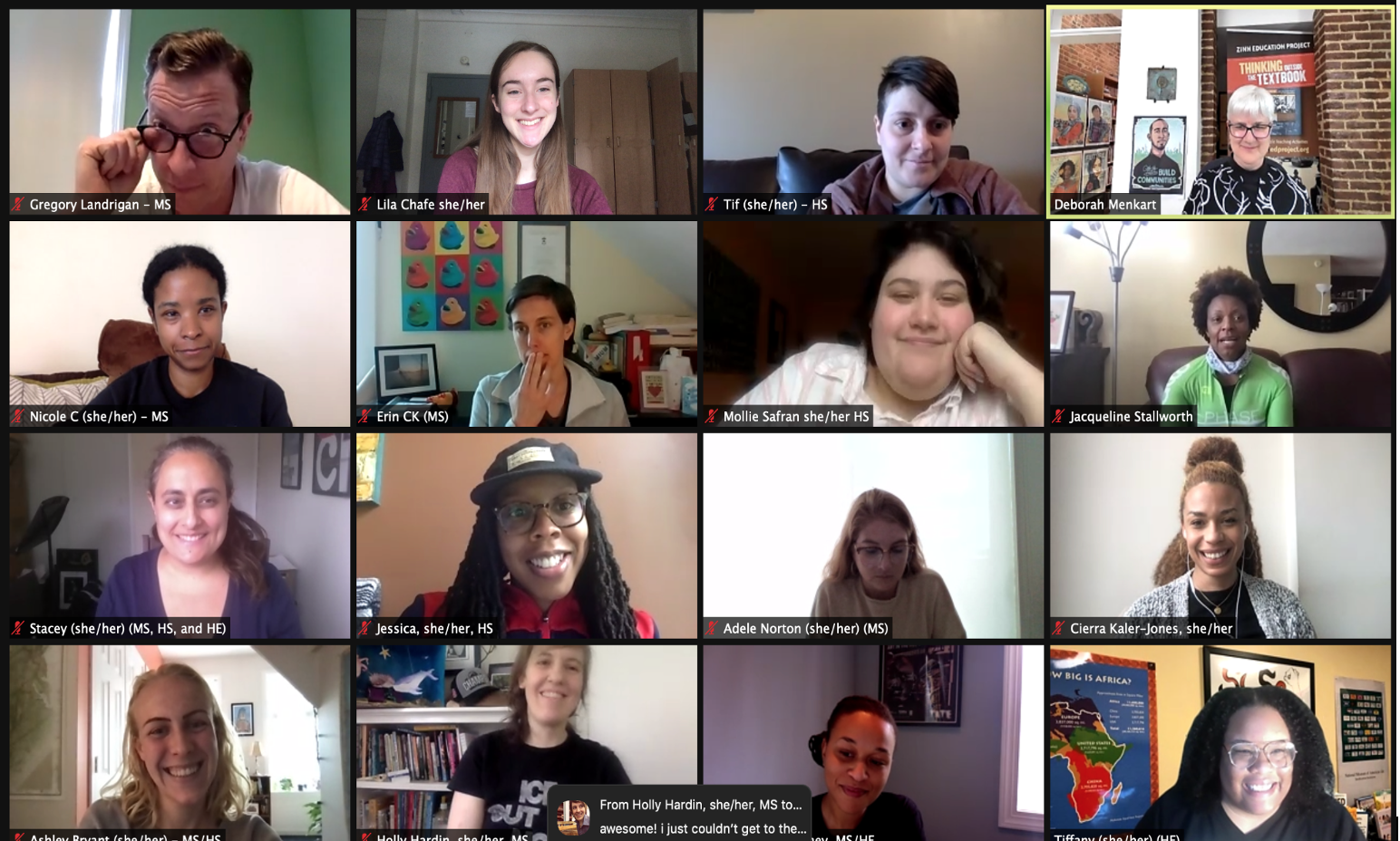Fugitive Pedagogy and Brown v. Board Lessons
Middle and High School People’s History Working Group
April 17, 2021
On Saturday, April 17th, the DCAESJ People’s History Curriculum Working Group met to reflect on fugitive pedagogy, try out a new lesson on Brown v. Board, and to foster community care. As educators joined the session, they reflected on the weight of ongoing police murders African Americans, and the group created space for the hardship and fear that participants carried with them. Opening the meeting, Tiffany Mitchell-Patterson shared, “I’m so thankful that everyone is coming to this sacred space amidst the hard news, and we hope you continue to come join us!”
The energy of the meeting continued as the chat filled with introductions. Then Deborah Menkart and Tiffany Mitchell-Patterson invited participants to write a collective poem. They began by asking each participant to share a brief statement about an ancestor that put them on the journey towards liberation. The people listed below were among the activists, grandparents, and neighbors celebrated in our collective poem.
Rudes McGann, a community member committed to doing the radical work of showing kindness to all
Stacey Abrams, a steady and focused hero
Audre Lorde, a crusader for wellness as a political act
Alexis Murphy, a revolutionary’s revolutionary
In numbered sequence, the participants read their line aloud. As voices flowed in and out of the call, we celebrated each other’s histories while building for a stronger future.
Transitioning to our lesson on fugitive pedagogy, Tiffany Mitchell-Patterson asked us to do a quick shout out and show up for each other. We read an excerpt from Fugitive Pedagogy: Carter G. Woodson and the Art of Black Teaching to remember that we are following the age-old path of abolitionist teaching and fugitive pedagogy. Reflecting on fugitive pedagogy, participants agreed that resisting the dominant curriculum allows teachers to liberate.
In people’s history fashion, we took a few minutes for individual reflection through Padlet. Participants entered their visions of fugitive pedagogy, sharing lesson plans disrupting the idea that race is non-white, hopes of queering the history students are taught, and plans to engage students in critical thinking about monuments.
Next, we moved into small groups to further discuss these examples of fugitive pedagogy. In the ten minutes spent sharing teaching stories with small groups, educators shared resources and provided guidance. The “Teaching Hard History” podcast developed by Learning for Justice was recommended.
In the full group, Jessica Rucker articulated that Blackness is a performance of resistance to what we consider central knowledge. Group greetings, brain breaks, and daily tasks can be centered on educational fugitivity because they resist the binding narrative of rigor and common core. The Working Group reflected that ordinary moments can be extraordinary in teaching because of the constraining expectations of testing and schedule, and it is in these transition moments that we can practice abolitionist teaching.
In a moment of gratitude, we departed from the meeting’s focus to celebrate and love Cierra Kaler-Jones for her incredible work during her fellowship. With tears, laughter, and love, we shared our gratitude for her incredible work in amplifying the work of teachers in the group and their students.
Next, Tiferet Ani presented her lesson on the effectiveness of Brown v. Board to get feedback from the group before it is implemented into Montgomery County Public Schools curriculum. The group participated in an image analysis as an introductory activity/warm up, comparing images of white flight across history in the context of school segregation. Participants then got into small groups to discuss one each of the five core questions of the lesson while referencing primary documents for their respective group.
We returned to share feedback and questions about the lesson. The comments addressed the effectiveness of the interactive slides, ideas to help develop background knowledge, and concerns regarding the accessibility for English Language Learners and the integration of Latinx desegregation movements.
After a rejuvenating session, Jessica Rucker expressed deep gratitude for the thought partnership presented by the Working Group. She shared that “we are all humbled and grateful for holding space for each other in this tough time.” After filling out evaluations, educators left the call with support and fuel for the upcoming weeks in the classroom.
This recap was written by Lila Chafe, a volunteer with Teaching for Change in the 2020-2021 school year while studying education at Barnard College.

